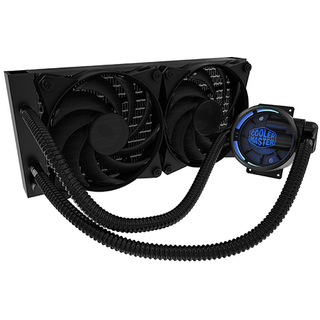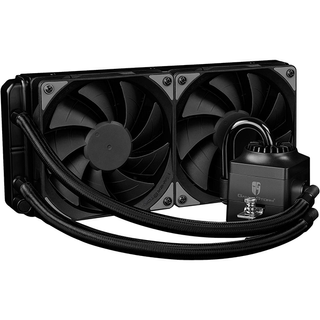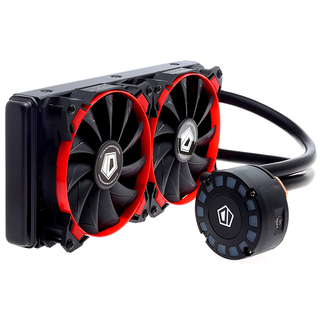ID-Cooling Auraflow 240 CPU Cooler Review
Why you can trust Tom's Hardware
Comparison Hardware, Evaluation & Conclusion
We retain the hardware configuration from previous big cooler reviews while comparing the Auraflow 240 to previously reviewed rivals. We retain the stock fan configuration of our Corsair 760T case, removing the magnetic panel cover to mount radiators under its top panel in exhaust orientation.
Comparison Products
Three similarly-sized closed-loop coolers set the pace for the Auraflow 240, including ID-Cooling’s faster-spinning Frostflow 240L. The Captain 240EX RGB uses its own controller and an LED strip to cast RGB lighting asynchronously to the rest of a build. Both units feature RGB pump lighting.
Test Results
Top cooling performance came from ID-Cooling’s previously-tested Frostflow 240L. Unlike that sample, the Auraflow 240 races past the competing MasterLiquid Pro 240 toward the worst thermal reading. The MasterLiquid Pro 240 justified its thermal results with low noise. Will the Auraflow 240 be even quieter?
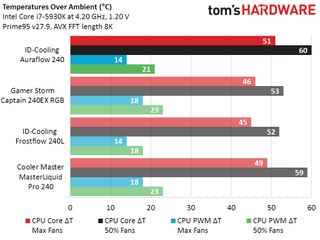
The Auraflow 240’s fans spin slower than the second-hottest cooler, the MasterLiquid Pro 240. On the other hand, its 1800 RPM rating is matched by the 1800 RPM measured in the cool-running Captain 240EX RGB.
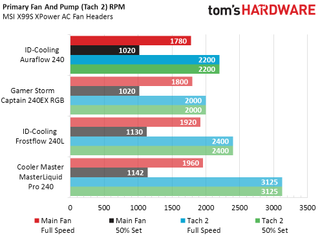
Cooler performance leadership was set by the Frostflow 240L, but that cooler was also the noisiest. Second place thermals went to the Captain 240EX RGB, and that cooler should have been the second noisiest. The Auraflow 240 disrupts the temperature-to-noise scale by being both the hottest and second-noisiest cooler when comparing the full-speed results of all four, yet also manages to be the second quietest at half speed.

A comparison of temperature and noise puts this into a better perspective: At full force, the Frostflow 240L’s temperature win was smaller than its noise loss. On the other hand, its temperature-to-noise ratio was relatively good at half speed. Today’s Auraflow 240 is nearly on par with its predecessor in acoustic efficiency.
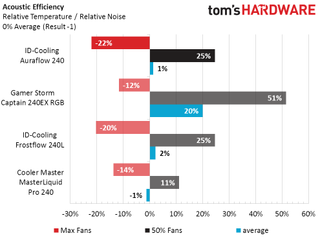
We should probably skip the value chart, since the RGB hardware adds nothing to the performance side of the equation. Still, it’s nice to see how the expense of these added parts affects the Auraflow 240 and Captain 240EX RGB slightly differently. The Gamer Storm cooler comes with more hardware (an RGB controller), while the Auraflow 240’s lack of that hardware allows it to instead synchronize with other motherboard-controlled RGB components.
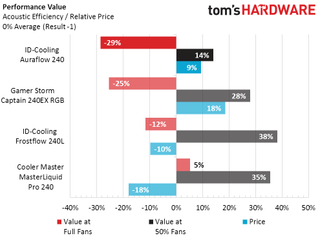
Perhaps the most amazing thing is how the MasterLiquid Pro 240 wins the price-to-performance battle even though it was never given any value award. Cooler Master radically lowered the price of that model immediately following our review, where it narrowly escaped award candidacy.
So where does that leave the value equation? Looking up a few acoustic efficiency charts, we see the Auraflow 240 had a range of 22% below average at full speed to 25% above average at half speed. The MasterLiquid Pro 240 had a range of 14% below average at full speed to 11% above average at half speed. The Auraflow 240 thus presents a wider range with a slightly greater net positive (+1% vs -1% average). I’m not one to complain about a noisy fan if it works effectively at lower and quieter speeds.
That motherboard-synchonized RGB is going to cost you though. It's a full $30 over the MasterLiquid Pro 240. I have some doubts about whether that feature is worth $30. You could certainly spend that much on a couple RGB fans, but you probably wouldn’t pay that much more than the base price of black fans. Or maybe you would. I can’t justify a value award (our Recommended label), but it’s good enough for us to give it a passing grade and let you decide the value for yourself.
MORE: Best CPU Cooling
MORE: How To Choose A CPU Cooler
MORE: All Cooling Content
Stay on the Cutting Edge
Join the experts who read Tom's Hardware for the inside track on enthusiast PC tech news — and have for over 25 years. We'll send breaking news and in-depth reviews of CPUs, GPUs, AI, maker hardware and more straight to your inbox.
